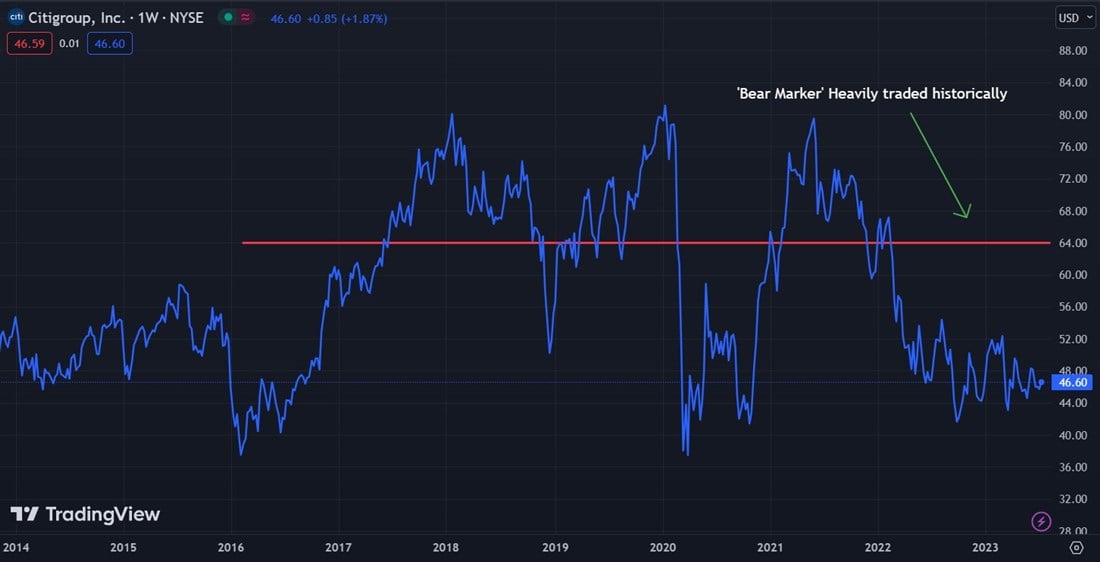Not too long ago, commercial and investment banks passed the annual FED 'stress test,' where banks are under the heat of liquidity and leverage scrutiny. The leading United States firms passed with flying colors, and some of these names followed the results by boosting their dividend payouts handsomely.
Citigroup NYSE: C was part of the winner's list passing the FED's tests. However, it also turned out to be the one bank to raise dividends by the lowest amount. However, the dividend payout decision may be more positive once investors consider where the dividend yield sits today.
Considering that Citigroup's annual dividend yield is 4.34% today, it marks one of the highest yields for the company during the past decade. A historically high dividend yield implies, as investors should keep in mind in terms of valuation, that it can become a dual-edged sword.
Normalizing the yield would involve lowering the payout or raising the stock price to compress the yield. Citigroup reported its second quarter 2023 earnings results in the pre-market hours of Friday morning, and the figures point to a higher stock rather than a dividend cut in this case.
Perspective, Cyclical Earnings
Citigroup stock declines by 2.0% during Friday's trading session, an initial adverse reaction to not-so-negative earnings. Investors should briefly look back into the stock price to find key liquidity levels to begin finding pivoting prices and considering that the stock hit a 2021 peak price of approximately $80.0 per share, followed by a subsequent decline toward today's level of $46.5 per share.
This decline is essential to remember when taking Wall Street's definition of a 'Bear Market,' characterized by a 20% decline from recent highs. This heavily traded level would be around $64 per share.

The above image showcasing Citigroup's chart, which clarifies how this 'Bear Marker' of a 20% decline off highs is heavily traded/respected, can be a compass for investors to place their proximate targets. If a potential purchase is considered, the $64 per share mark could act as an initial proxy target.
One catalyst that could get the stock there may lie in the bank's earnings results. Despite posting slowdowns in the top and bottom lines, the underlying drivers of the business are finding new traction into the next cyclical run.
Investors will find that the new trends dominating banking earnings will become a steady decline in investment banking revenues now that the FED is on a mission to cool off a heating economy.
By hiking interest rates and making financing harder for M&A (Mergers and Acquisitions) departments, these banks will likely see fees and revenues dry up within deal-making. Citigroup suffered an annual revenue decline of 24% in investment banking, followed by an additional 20% decline in corporate lending.
This is expected; as the underlying economy slows down (measured by falling inflation), businesses will not need as much financing due to slower business activity.
Future in Store
Full-year 2023 expectations laid out by management may reflect what the consumer is doing and trends that offset declines in other departments. United States card loans for Citigroup comprised more than 80% above 680 FICO scores, comprising 67% branded cards.
This can be a significant profit center that investors can lean on, especially when considering what could drive earnings higher and push the stock toward that $64 mark again. Since interest rates are rising, Citigroup's gross loan yield for the quarter rose to 8.63%, a significant increase from 5.81% a year ago.
When investors spread valuations in the diversified banking peer group, a widening upside potential begins for Citigroup. Taking the forward price-to-earnings ratio, as opposed to the conventional P/E, potential buyers can gauge where markets value the bank's future expected earnings.
Citigroup's forward P/E lies at 7.7x, well below other diversified banks like Wells Fargo & Company NYSE: WFC and Bank of America NYSE: BAC, which trade at 9.1x and 9.0x, respectively. A clear discount to the peer group begins to form, and other commonly used valuation multiples agree.
Not only does the forward P/E point to high potential, but the historically high dividend yield agrees, and investors can top this trend off with the price-to-book ratio. By trading at a 0.5x P/B ratio, it can be assumed that Citigroup is selling at a discount to its 'book' value, which is usually music to any value investor's ears.
Before you consider Bank of America, you'll want to hear this.
MarketBeat keeps track of Wall Street's top-rated and best performing research analysts and the stocks they recommend to their clients on a daily basis. MarketBeat has identified the five stocks that top analysts are quietly whispering to their clients to buy now before the broader market catches on... and Bank of America wasn't on the list.
While Bank of America currently has a Moderate Buy rating among analysts, top-rated analysts believe these five stocks are better buys.
View The Five Stocks Here
If a company's CEO, COO, and CFO were all selling shares of their stock, would you want to know? MarketBeat just compiled its list of the twelve stocks that corporate insiders are abandoning. Complete the form below to see which companies made the list.
Get This Free Report
Like this article? Share it with a colleague.
Link copied to clipboard.